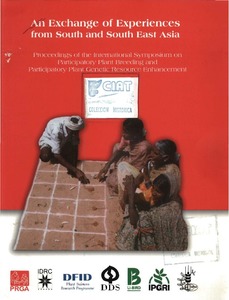Participatory improvement of rice crops with tribal farmers in India
Participatory research, including participatory plant breeding (PPB), is now a recognized option for improving Ibe Livelihood security of unreached fanners. Tribal fanners in India provide an ideal group for testing the potential of participatory interventions. They live in remote areas, are intensively bound by tradition, and continue to cultivate crops using traditional practices. For instance, the sowing time of crops is often based on a particular month, with an almanac date lo harvest the crop in time for is use during festive occasions. Although these traditional cultivation practices are often poorly matched with the weather, they continue because they are consonant with the habitat, soil, agro ecology, and available infrastructure. Soils are relatively free from the problems of continuous chemical fertilization. Most cultivated varieties are specific landrace. That carry special traits for cooking quality and taste, catering to the tribal fanners' methods of processing food. Tribal fanners live in small villages, inconveniently distant
from one another, and do not have readily accessible mean. Of producing and exchanging community seed. Traditional varieties landraces are also not commercially competitive. Driven by poverty, the tribal Canners yield to commercial exploitation where the cultivation of landraces, local varieties, and other valuable genetic material is replaced by Ibe cultivation of modem varieties despite the feat that they are not preferred by the tribal community. The result is a gradual erosion of precious genetic diversity, most of which is also site-specific. This situation calls ungently for preventive measures.
Jeypore tract in Orissa State is a secondary center of rice origin. Yet fanners do not realize the potential Yield of the rice landraces growing there. One reason is that the traditional practices developed essentiality for avoiding risks are out of tune with those needed for realizing high yields. Participatory initiatives, setting appropriate methods of cultivation based on a realistic evaluation should provide the right corrective step. This paper describes and discusses such initiatives in the Jeypore tract of Orissa.

